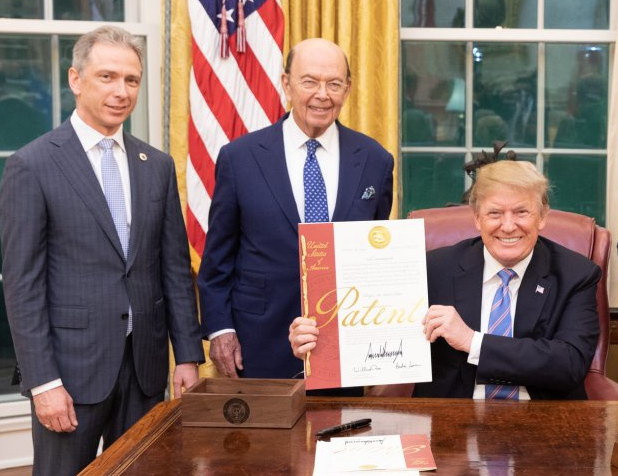

THE turmoil at the SCOTUS made a lot of headlines in mainstream media (first because of Gorsuch and later Kavanaugh); little attention has been paid to the USPTO.
"Thorne politely complains about this Trump pick, but it's probably too late."The Trump-appointed Justice Gorsuch has already signaled that he is bad news for patent reform. Professor Michael Risch has just taken note of this new paper co-authored by Unified Patents. The paper is all about Gorsuch and the abstract says: "In his first term, Justice Neil Gorsuch has made a surprisingly forceful impact on, of all things, patent law—and even more unlikely, the United States Patent and Trademark Office’s adjudicatory arm, the Patent Trial and Appeal Board. Was there any way to predict, from his 10th Circuit opinions below, that he would author opinions in all three patent cases in his first term? Was this attention the result of deeply submerged but long-felt opinions on patent law, or rather a result of his sharp distrust of administrative overreach? We analyze 10th Circuit and Supreme Court opinions authored by Justice Gorsuch, and conclude his unforeseen interest springs from his desire to limit agency power rather than from any particular concern with patents. Still, his opinions—intentionally or by happenstance—will reverberate through our patent law for years."
Then there's the Trump-appointed Director Iancu, whose words and actions have been toxic enough to invoke this HTIA Statement/"Response to Director Andrei Iancu's Speech Before the Eastern District Texas Bar Association," which says (in full):
"At a speech before the Eastern District of Texas Bar Association, Director Iancu likened patent trolls to imaginary characters that were created to frighten innovators away. Unfortunately for legitimate American business and job creators of all sizes, patent trolls and the invalid patents they wield for their abusive tactics are a very unfortunate reality.
"Poor quality patents fueled much of the explosion in litigation from 2005 to its peak in 2015, when patent litigation increased fourfold. In 2012, through the America Invents Act, Congress created the Inter Partes Review (IPR) process to improve patent quality because it was so clear that the effect of low quality patents were not only draining resources from large and small companies and harming innovation, but the brunt of that increase was borne by the highly innovative U.S. high tech industry and brought by non-practicing entities (NPEs).
"NPE suits account for 90% of patent litigation involving high-tech products and services. But the IPR process along with the Supreme Court’s Alice decision have gone a long way to help level the playing field. The result is that since 2012, U.S. companies have increased their investment in research and development by almost $200 billion per year and venture capital funding has increased dramatically from 2012 to 2017.
"Improving patent quality actually works and we hope that addressing this problem will be a top priority of Director Iancu and the Patent and Trademark Office.”
The High Tech Inventors Alliance is comprised of eight technology companies: Adobe, Amazon, Cisco, Dell, Google, Intel, Oracle and Salesforce. These companies have over 447,000 employees in the United States, have invested $62.9 billion in research and development in the past year and hold a total of over 115,000 U.S. patents.
The case at issue here stems from the CAFC’s affirmance of the lower court’s Rule 12(b)(6) dismissal — finding that the claims of U.S. Patent No. 8,266,432 are invalid as directed an abstract ideas. The claims here are directed to a user authentication system that uses using a central computer to send a temporary dynamic code to a user and then validate the code when submitted by a third party (who is conducting a transaction with the user).
The patentee argues that the facts would show that its approach is an innovative implementation — but the district court dismissed the case without considering any submitted evidence. The district court issued its decision prior to Berkheimer and Aatrix. However, on appeal, the Federal Circuit affirmed the dismissal without considering the impact of those decisions (R. 36 Judgment without Opinion).